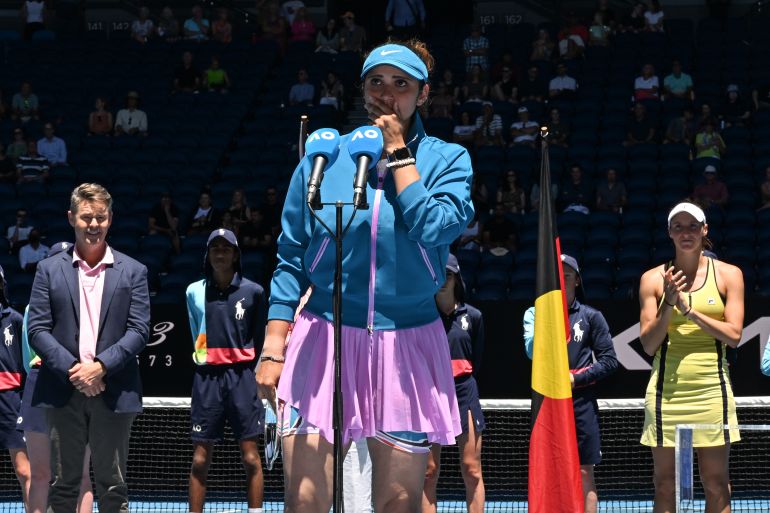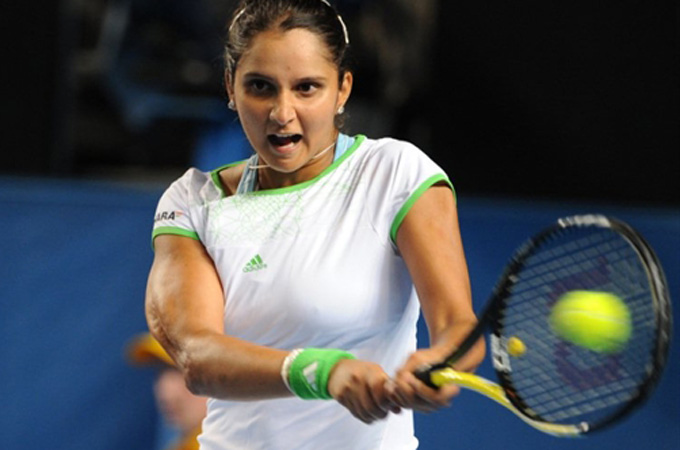Sania Mirza retires: You can still dream after becoming a mother
India’s biggest tennis star talks to Al Jazeera after retiring from tennis on her new life outside the courts.

Indian tennis icon Sania Mirza has retired from the game, ending a professional career that lasted 20 years.
Mirza won six doubles Grand Slam titles and 43 major titles in a career that began on dusty courts made out of cow dung in the southern Indian city of Hyderabad at the age of six.
Keep reading
list of 4 itemsMisogynoir in sports: How Black women athletes are devalued
‘Happy tears’ as Sania Mirza plays last Grand Slam match
Naomi Osaka announces pregnancy, plans return to tennis in 2024
In 2005, she broke onto the Grand Slam circuit as an 18-year-old when she reached the third round of the Australian Open. The same year, Mirza reached the second round of Wimbledon and became the first Indian woman to reach the fourth round of the US Open, where she lost to top seed Maria Sharapova.
The 36-year-old was ranked number one in women’s doubles for 91 weeks during the 2015 season, when she teamed up Martina Hingis to form one of the most formidable women’s doubles pairs in history.
Here, Mirza tells Al Jazeera about how she got involved with tennis and what happens next.
Al Jazeera: How and when did you start playing tennis?
Mirza: I was six when I picked up a tennis racket for the first time. I played at a local sports club, where the courts were made out of cow dung that was flattened and painted upon.
This was 30 years ago, at a time when nobody had heard of young Indian girls saying they wanted to become professional tennis players.
I used to swim, play tennis and skate. I tried my hand at different sports. I started improving rapidly at tennis, prompting my parents and coach into thinking that it might be worth a try to take it up. I was eight when I beat a girl twice my age in an under-16 state tournament. It was a standout match that I still remember very well.
From India and beyond, fans express gratitude to @MirzaSania for her inspiring career 🧡💚 pic.twitter.com/H88YxK0bqb
— Tennis Channel International (@TennisChanneli) February 23, 2023
Al Jazeera: Did you always want to play tennis or was the love for the game fostered by your parents?
Mirza: I loved playing sport. I didn’t necessarily have an obsession towards tennis. It wasn’t like my parents sat me down one day and said you’re going to become a professional tennis player.
As a child, when you are good at something, you start liking it. I was so much better at tennis than I was at other sports that I automatically started enjoying.
Al Jazeera: What was it like to step into the professional tennis circuit as an Indian?
Mirza: It was something no one had ever done in terms of the calibre that I was playing at. Everyone who watched me, even when I was a teenager, used to tell my parents that I was really good.
We didn’t have role models to follow or a path laid down. It was always a question of what to do next. We figured things out as I progressed. We made a lot of mistakes. But as a family, we took pride in everything we did together. We had fun along the way.
Al Jazeera: How did the public react when you first broke into the Grand Slam main rounds?
Mirza: I had a huge breakthrough year at the 2005 Australian Open. I was 18 then, and the reaction [when I made it to the third round] was incredible. It made me a star overnight.
People from the subcontinent started realising that we can be good at a global sport and compete against the best in the world. It was a big realisation. The love that I have received since that day in 2005, up until today, has been immense. Obviously, with the good comes a little bit of bad and that is part and parcel of being a public figure.
"No-one really believed a girl from India could achieve things that people thought were just a joke."
🇮🇳 @MirzaSania bows out from her remarkable career at @DDFTennis 💜pic.twitter.com/Z85N6qhL8P
— wta (@WTA) February 23, 2023
Al Jazeera: What was it like taking up professional sport as an Indian girl?
Mirza: I faced several cultural issues as a young girl wanting to play tennis. It was something completely unheard of. Today we have so many great champions from this part of the world who are women, but it was not the case back then.
Instead of encouraged to pursue our dreams, young girls and women from the subcontinent are given a list of things that they can’t do. Barriers still exist but women have to come up and say that they will pursue their careers even if they are outside the box. It’s these women who will make a difference in the end.
Al Jazeera: Why has there been a void in women’s tennis in South Asia since your arrival?
Mirza: I have been answering this question for 20 years and I still come up empty, unfortunately. Although the infrastructure is a lot better now, there is no system in place for aspiring athletes.
You can only produce players year after year when you have an actual system that works. If somebody wants to take their child to play tennis, they don’t know what to do. It’s individuals like me or Rohan [Bopanna] who are trying to set up academies where we are able to share our experience. But being individuals there’s only so much that we can do.
You won’t get champions on a yearly basis, you will only get them every 20 or 30 years.
Al Jazeera: You are still ranked in the women’s doubles top 30. You just played a Grand Slam final. Why did you decide to quit?
Mirza: I like doing things on my own terms. For me, it is very important that people ask me why, rather than when I’m quitting.
Maintaining a good level of tennis has never been a question for me, and I’m aware of it. But my body is beat. I am emotionally and mentally quite beat. I have been a professional athlete for 20 years. It’s taking a lot out of me emotionally, mentally and physically to stay at this level. I don’t have the will to push all the way to maintain it.
If someone told me I could just play and compete without training, practising and the other things that go with it, I would take it. At the age of 36, I want other things in life. It’s time to move on.

Al Jazeera: You returned to tennis after giving birth to your son. What was it like?
Mirza: It was really hard physically. Mentally, I was ready. It was excruciating to put in all the work again. I gained 23kg during pregnancy, and lost 26kg in four months once I decided to return. And it was only the first battle. Getting in shape and playing was so hard.
And then to coordinate all the logistics because of my son. Who travels, how much does my son travel, etc …
It wasn’t easy, but was it worth it? 100 percent. If that video of my son running into my arms on a Grand Slam court inspires even one mother, it would have been worth it. I wanted to show that you can still dream after becoming a mother, and you can fulfil your dreams as well. Just because you have a family or because you have other responsibilities, doesn’t mean you quit. It is very important that I inspire people with my journey.
Al Jazeera: What are your post-retirement plans?
Mirza: To be in a quieter space. Spend some quality time with my son. I feel like he needs me now more than ever and I want to be around for those school years, do the school runs.
And then I have a few tennis academies in Dubai and one in Hyderabad that I need to look after.
Al Jazeera: How did people react to your decision?
Mirza: I have received messages on social media, phone calls, and messages. It has been really nice to know that I have been able to make a difference in young girls’ lives.
Everyone from the subcontinent, especially girls who are trying to achieve success in sports, go through a struggle, be it cultural or religious.
Even if I have been able to inspire one person I will be happy. If I have been able to inspire a few, I will feel like my journey has been fulfilled.